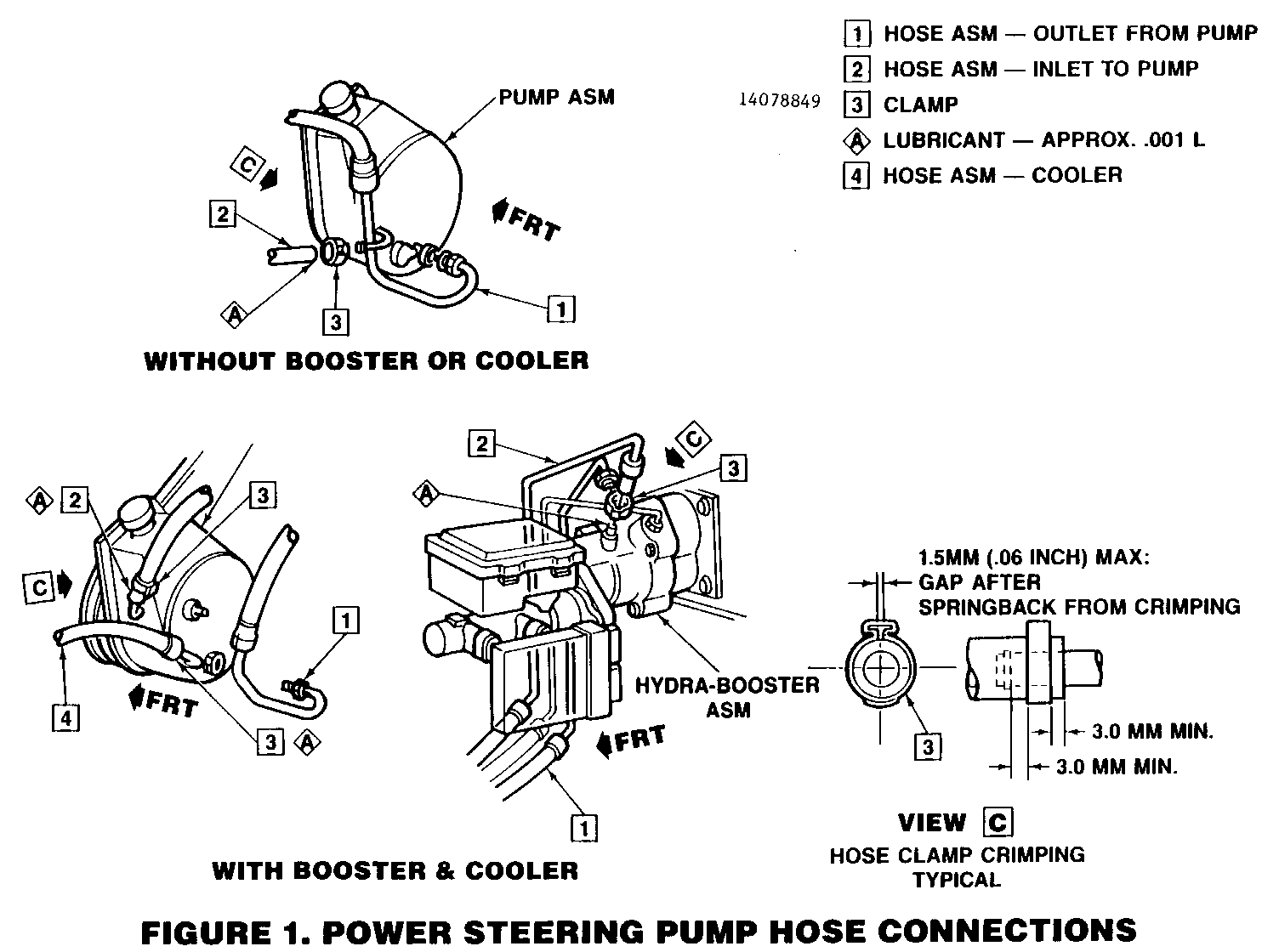POWER STEERING WHINE ON COLD START

POWER STEERING WHINE ON COLD START (PROPER CLAMPING OF POWER PUMP INLET HOSE TO INLET TUBE
VEHICLES AFFECTED: 1988 C/K -----------------
The power steering pump on some 1988 C/K trucks may whine on cold start. This can be caused by improper clamping of the pump inlet hose to the inlet tube. This condition can allow air to be pulled into the pump system. Low power steering fluid level may also contribute to the condition.
SERVICE PROCEDURES (Figure No. 1) ------------------
To remedy the above condition, check the pump inlet hose clamp for proper installation and the power steering fluid for proper level.
Inspect and repair condition as detailed below.
INSPECTING CLAMPS AND HOSES
Check Oetiker clamp (3) on the pump inlet hose assembly (2) for tightness. When the clamp is initially installed, some degree of springback is normal. The springback should result in no more than 1.5 MM (.06 in.) gap in the clamp as shown in view "C" of Figure No. 1.
If gap is excessive, remove old clamp and install new clamp. New clamp and hose must be installed on tube to dimensions shown in view "C". Crimp new clamp (3) down to zero gap and allow clamp to spring back. Check for 1.5 mm (.06 in.) maximum gap. Use crimping tool J35910 to obtain satisfactory crimp.
An easy method of checking the clamp gap is to attempt to slip a common size 53 drill bit through the clamp against the hose. If the bit does not slide through, the clamp is tight enough, (the bit is .0595 inches in diameter). If the bit slides easily through the gap, the clamp is not tight enough. A new clamp must be installed and crimped as described in the procedure above.
On vehicles with boosters and coolers, also check the clamps on the cooler hose assembly (4) and on both ends of the booster outlet hose assembly (2).
Finally, check all hoses and fittings for damage or deterioration and replace as necessary.
CHECKING POWER STEERING FLUID LEVEL
1. Run the engine until power steering fluid reaches normal operating temperature, about 80 degrees centigrade (170 F), then shut engine off.
2. Remove reservoir cap and check fluid level on dipstick. The level should be about 35.0 to 45.0 mm (1-3/8 to 1-3/4 inches) from the top.
3. If fluid level is low, add GM 992646 fluid or approved equal.
NOTE: If power steering hoses have been disconnected, the air must be bled from system to check level. Refer to Section 3B of the Service Manual for procedures.
REPLACING POWER STEERING HOSES
If a power steering hose is replaced for any reason during this service procedure, the following points are essential:
1. Route hoses in the same position they were in before removal. 2. Route hoses smoothly, avoid sharp bends and kinking.
3. Torque pressure hose connections to 33 Nm (24 lbs/ft).
NOTE: For proper hose orientation, before torquing pipe fittings:
a. Rotate pump outlet pipe to rest against pump housing. b. Rotate steering gear outlet pipe to rest against steering gear cover. c . Rotate steering gear inlet pipe to rest against outlet pipe.
4. Bleed power steering system. Refer to Section 3B of the service manual.
5. Check for leaks during bleeding.
CAUTION:
Do not run engine with hoses disconnected or damage to power steering system could occur.
PARTS INFORMATION
Part Number Description Quantity ----------- ----------- --------
14078849 Clamp, power steering hose 1 992646 GM power steering fluid As Req'd (or equivalent)
SPECIAL TOOLS REQUIRED
Clamp crimping tool - J000635910

General Motors bulletins are intended for use by professional technicians, not a "do-it-yourselfer". They are written to inform those technicians of conditions that may occur on some vehicles, or to provide information that could assist in the proper service of a vehicle. Properly trained technicians have the equipment, tools, safety instructions and know-how to do a job properly and safely. If a condition is described, do not assume that the bulletin applies to your vehicle, or that your vehicle will have that condition. See a General Motors dealer servicing your brand of General Motors vehicle for information on whether your vehicle may benefit from the information.
